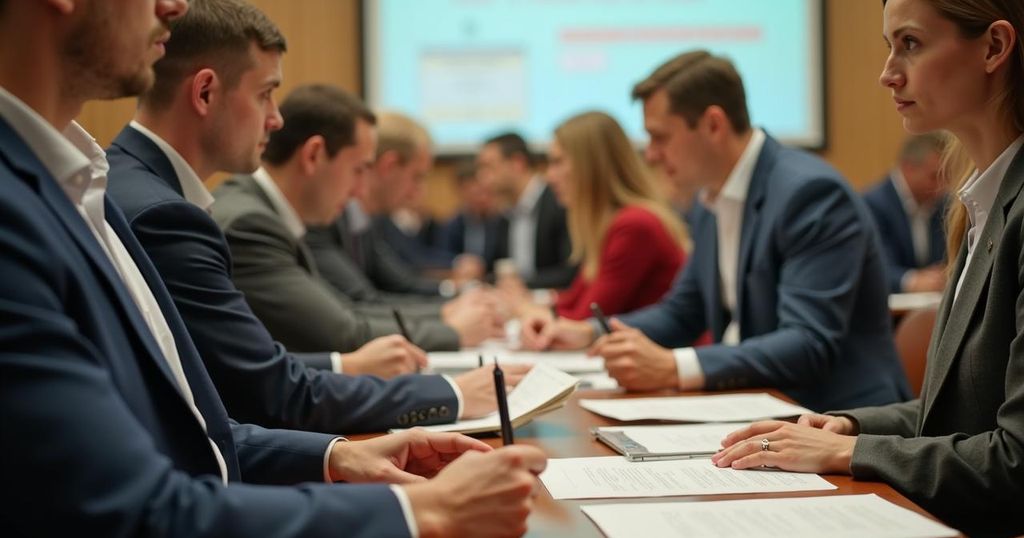Lithuania’s parliamentary elections began, with voters expressing a desire for change despite economic growth. Polls indicate the Social Democrats may outpace the ruling coalition. Criticism has centered on the government’s handling of COVID-19 measures and migrant influxes, with the political landscape demanding coalition-building as no party is likely to achieve a majority. The elections occur amid growing geopolitical tensions with Russia, impacting voter sentiment.
On Sunday, Lithuania commenced the first round of parliamentary elections, with the possibility of the ruling center-right coalition being supplanted by the opposing Social Democrats and smaller center-left entities. Despite the country experiencing notable economic advancements, including impressive double-digit personal income growth and one of the lowest inflation rates within the European Union, discontent among voters persists. Political analyst Rima Urbonaitė from Mykolas Romeris University observed, “There is a lot of disappointment and discontent among voters,” citing various crises that overshadow economic progress. Prime Minister Ingrida Šimonytė’s government, which assumed office in 2020, has been criticized for its severe COVID-19 pandemic measures and inadequate support for businesses during lockdowns, coupled with complaints regarding access to health care services. Additionally, Šimonytė faced backlash over her management of the migrant situation, stemming from an influx of individuals arriving from Belarus, compounded during a time of rising tensions due to Russia’s actions in Ukraine. A poll conducted by Vilmorus indicates that the Social Democratic Party, under the leadership of Vilija Blinkevičiūtė, is expected to secure the highest number of votes, significantly outpacing Šimonytė’s Homeland Union. Nevertheless, no single party is projected to acquire more than 20 percent of the votes, necessitating coalition-building. The Social Democrats have excluded the possibility of aligning with the controversial right-wing Nemuno Aušra party. Therefore, it is anticipated that three or four smaller central parties will be required to form a governing coalition. Voter sentiments reflect a shift in allegiance, with some, like 51-year-old educator Darius Mikalauskas, considering supporting new parties rather than sticking with the long-standing conservative option. Analysts noted that a leftward political shift would unlikely alter Lithuania’s foreign policy direction, which largely aligns with the President’s stance, particularly in light of the prevailing geopolitical climate in Eastern Europe. The elections will ultimately decide the composition of the Seimas, with 2.4 million citizens eligible to vote for 141 members over two rounds, concluding with a runoff on October 27.
The parliamentary elections in Lithuania represent a pivotal moment for the nation as voters express a desire for change despite the apparent success of the economy. Under the leadership of Prime Minister Ingrida Šimonytė, the government has faced challenges related to pandemic policies and migrant management, which have eroded public confidence. The shifting political landscape is evidenced by polling data indicating a potential rise of the Social Democrats, historically a dominant party firm in the nation’s political scene. Moreover, the ongoing geopolitical uncertainties surrounding Russia’s actions in Ukraine heighten the stakes of this electoral process, emphasizing the importance of strategic alliances in forming a new government.
The initial round of Lithuania’s parliamentary elections signifies a potential shift away from the ruling conservative coalition, with the Social Democrats gaining traction amidst voter discontent over economic management and other pressing societal issues. As the nation heads towards the runoff, coalition-building will be essential, reflecting the fragmented nature of current political preferences. The upcoming elections will not only reshape the parliamentary landscape but also test the resilience of Lithuania’s governance in a volatile geopolitical context.
Original Source: www.pbs.org







